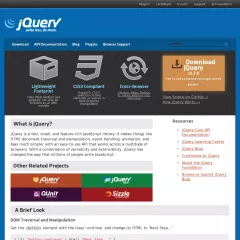jQuery 
jQuery is used by 22.46% of sites
Official Website
https://jquery.comCategory
JavaScript Libraries
jQuery is a fast, small, and feature-rich JavaScript library that simplifies the process of interacting with HTML documents, handling events, manipulating the DOM (Document Object Model), and creating animations and effects on web pages. It was developed to make web development tasks easier and more efficient.
jQuery provides a concise and intuitive API (Application Programming Interface) that abstracts and simplifies many common JavaScript tasks. It allows developers to write fewer lines of code while achieving the same functionality compared to traditional JavaScript.
Some key features and benefits of jQuery include:
DOM Manipulation: jQuery provides a set of methods to select and manipulate elements on a web page. It simplifies tasks such as traversing the DOM tree, modifying element attributes, adding or removing elements, and changing the CSS styles.
Event Handling: jQuery offers a unified approach to handling events across different web browsers. It provides methods to attach event handlers, listen for user interactions (such as clicks, keypresses, or mouse movements), and respond accordingly.
AJAX Support: jQuery simplifies the process of making asynchronous HTTP requests (AJAX) to retrieve data from a server without requiring a page reload. It provides methods to send requests, handle responses, and update the web page dynamically.
Animation and Effects: jQuery includes built-in animation and effects functions that allow developers to create smooth transitions, fade-ins, slide-outs, and other visual effects on web elements with minimal effort.
Cross-Browser Compatibility: jQuery takes care of many browser inconsistencies and provides a consistent API that works across different web browsers, including older versions of Internet Explorer.
Plugin Ecosystem: jQuery has a vast ecosystem of plugins created by the community, offering additional functionality and ready-to-use solutions for various web development tasks.
Overall, jQuery simplifies JavaScript programming, enhances productivity, and promotes cross-browser compatibility. However, it's worth noting that with the advancements in modern JavaScript and browser APIs, the need for jQuery has decreased in recent years. Many of its features and functionalities are now natively available in modern browsers, and alternative libraries and frameworks like React, Vue.js, and Angular have gained popularity.
jQuery provides a concise and intuitive API (Application Programming Interface) that abstracts and simplifies many common JavaScript tasks. It allows developers to write fewer lines of code while achieving the same functionality compared to traditional JavaScript.
Some key features and benefits of jQuery include:
DOM Manipulation: jQuery provides a set of methods to select and manipulate elements on a web page. It simplifies tasks such as traversing the DOM tree, modifying element attributes, adding or removing elements, and changing the CSS styles.
Event Handling: jQuery offers a unified approach to handling events across different web browsers. It provides methods to attach event handlers, listen for user interactions (such as clicks, keypresses, or mouse movements), and respond accordingly.
AJAX Support: jQuery simplifies the process of making asynchronous HTTP requests (AJAX) to retrieve data from a server without requiring a page reload. It provides methods to send requests, handle responses, and update the web page dynamically.
Animation and Effects: jQuery includes built-in animation and effects functions that allow developers to create smooth transitions, fade-ins, slide-outs, and other visual effects on web elements with minimal effort.
Cross-Browser Compatibility: jQuery takes care of many browser inconsistencies and provides a consistent API that works across different web browsers, including older versions of Internet Explorer.
Plugin Ecosystem: jQuery has a vast ecosystem of plugins created by the community, offering additional functionality and ready-to-use solutions for various web development tasks.
Overall, jQuery simplifies JavaScript programming, enhances productivity, and promotes cross-browser compatibility. However, it's worth noting that with the advancements in modern JavaScript and browser APIs, the need for jQuery has decreased in recent years. Many of its features and functionalities are now natively available in modern browsers, and alternative libraries and frameworks like React, Vue.js, and Angular have gained popularity.